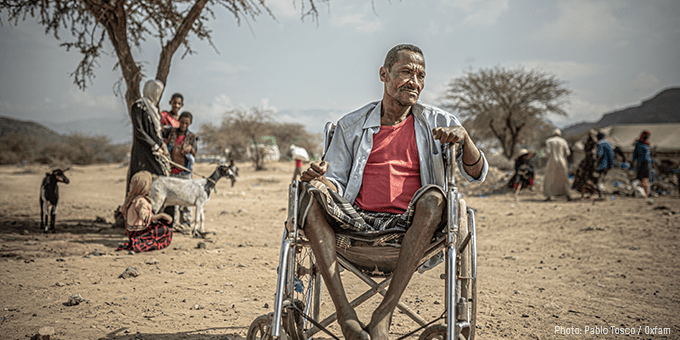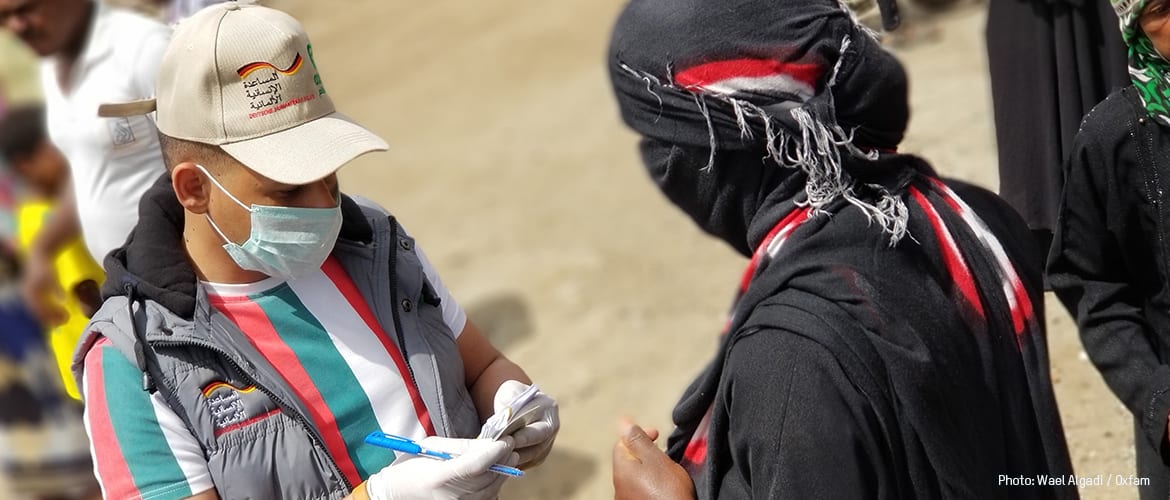Nearly two out of every five families in Yemen buy food and medicines using debt, according to Oxfam research published today.
Yemeni families are trapped in a cycle of informal debt, living precariously and reliant on good will of shopkeepers as they lurch from one month to the next.
Many told Oxfam they can’t borrow the money they need for essentials unless shopkeepers know they have a monthly income and for many this means the money they receive from humanitarian agencies.
Last year, donors only provided half of the aid money needed for the world’s largest humanitarian crisis and with the 2021 UN humanitarian need budget for Yemen due out imminently, Oxfam is urging the international community to be generous when pledging funds.
The research found that Yemeni shopkeepers estimate that the number of families using debt to buy food has risen by 62 per cent since the conflict in Yemen started in 2015. Pharmacists in Yemen estimate an increase of 44 per cent in debt being used to purchase medicines.
Layla Mansoor,31, and her family were forced to flee from their home in an active conflict zone in Hodeidah three years ago – they escaped with barely more than the clothes on their backs. Layla says she is often in debt to the shops she buys their food from and each month they owe between 10,000 and 12,000 YER (around USD $11-$15). Her family can’t afford to eat meat or fish except on rare occasions. She said:” At the moment we’re living a nightmare. Thankfully, until now, we haven’t needed any kind of medical treatment – but I’m afraid that we won’t afford it, if one day we do.”
Ibrahim Alwazir who carried out the research for Oxfam in Yemen said: “To struggle this hard to be able to provide food and medicine for one’s family is an avoidable hardship that millions have to overcome on a daily basis. We need peace so no more Yemenis are forced to flee their homes and live in poverty. Peace will allow people to rebuild their lives and businesses, but we need support to help communities to do that. This war has turned my country into the world’s largest humanitarian crisis and it’s only getting worse. We all just want to get back to normal life.”
Some 24.3 million Yemenis, over 53 per cent of the population, currently need humanitarian assistance. This year, 16.2 million Yemenis will rely on food aid to survive, with 17.9 million lacking access to healthcare in a country where only half of health facilities are fully functional. It is estimated that in parts of Yemen one in five children are severely malnourished and will grow up with life-long medical conditions if they do not get more food.
Oxfam, along with other agencies in Yemen, provides support for struggling families in the form of cash transfers which allows people to choose what they buy and helps stimulate local markets.
Many families who are struggling with debt say that they are living permanently in arrears – using their transfer to pay off what they owe and then run up more debt as they wait for their next aid payment. This situation is worsening because high levels of inflation, fuelled by the conflict, mean that the value of money is decreasing. In practical terms the same amount of cash buys fewer groceries each month.
Hind Qassem, 45, was pregnant with her tenth child when her husband was killed by an artillery shell forcing her to flee with her children. At first, they lived under a plastic sheet, relying on leftovers given by neighbouring families. Three of her sons suffer from sickle cell anaemia and need blood transfusions every month. She said: “Now, I receive YER 45,000 (around US$70) every month, yes, it is not enough to cover all our needs but it helps a lot. I am now able to pay for my children’s treatment and buy some flour and vegetables for us to eat. Shops will now allow us to buy food on credit because we are receiving monthly assistance.”
Food shop and pharmacy owners both told Oxfam staff that they allow customers to buy items on credit because they sympathise with the harsh difficulties they are facing. Some also said that it makes economic sense for their business and pharmacy owners also said they did not want to feel responsible for someone’s death if they refused credit for medicines.
Grocery store owner Abdulkareem Salaeh from Sana’a said: “We are left with no choice (but to offer credit) people are desperate, and we are struggling to keep the business going. While some are able to pay, others can’t and that’s a problem. We only agree to lend people with a reliable source of income, like employees, business owners, daily wage labourers or those receiving humanitarian aid, else it will be a loss that we can’t afford. We are barely able to cover operational costs and the costs of goods we sell. It’s unfortunate!”
Grocery shop owners have told Oxfam that debt is most often used to buy basic commodities like bread, flour, sugar, rice, legumes and cooking oil. In pharmacies, debt is typically used to buy medicines for diabetes and high blood pressure or for fevers and diarrhoea in rural areas.
Concerned business owners told Oxfam that they feel the debt situation is unsustainable as their customers are increasingly unable to pay off all their debt each month and so the rising levels of debt their businesses are carrying mean their future is looking uncertain.
If business owners stop allowing them credit people will be unable to eat, driving higher levels of malnourishment. Oxfam is also worried that if shop owners do not have funds to replenish stock the resulting shortages will drive food prices even higher.
Notes to editors:
Research findings are based on 30 surveys by Oxfam in Yemen of grocery and pharmacy store owners across Sana’a, Hajjah, Ibb and Aden Governorates in November and early December 2020. All surveys were collected near poor and densely populated neighbourhoods within cities and suburban areas, with some of them being close to IDP settlements where humanitarian aid groups are active
Oxfam is supporting Raghad Jubran, one of 1690 families (11,830 people) in Bani Thawab sub-district of Abs district in Hajjah governorate.
Aid relief information and update
Health care facility information from UN Yemen HRP 2020
Figures for numbers facing starvation and reliant on food aid taken from here
For more information, or to arrange an interview please contact:
Kelsey-Rae Taylor on kelsey-rae.taylor@oxfam.org.nz or 021 298 5894








